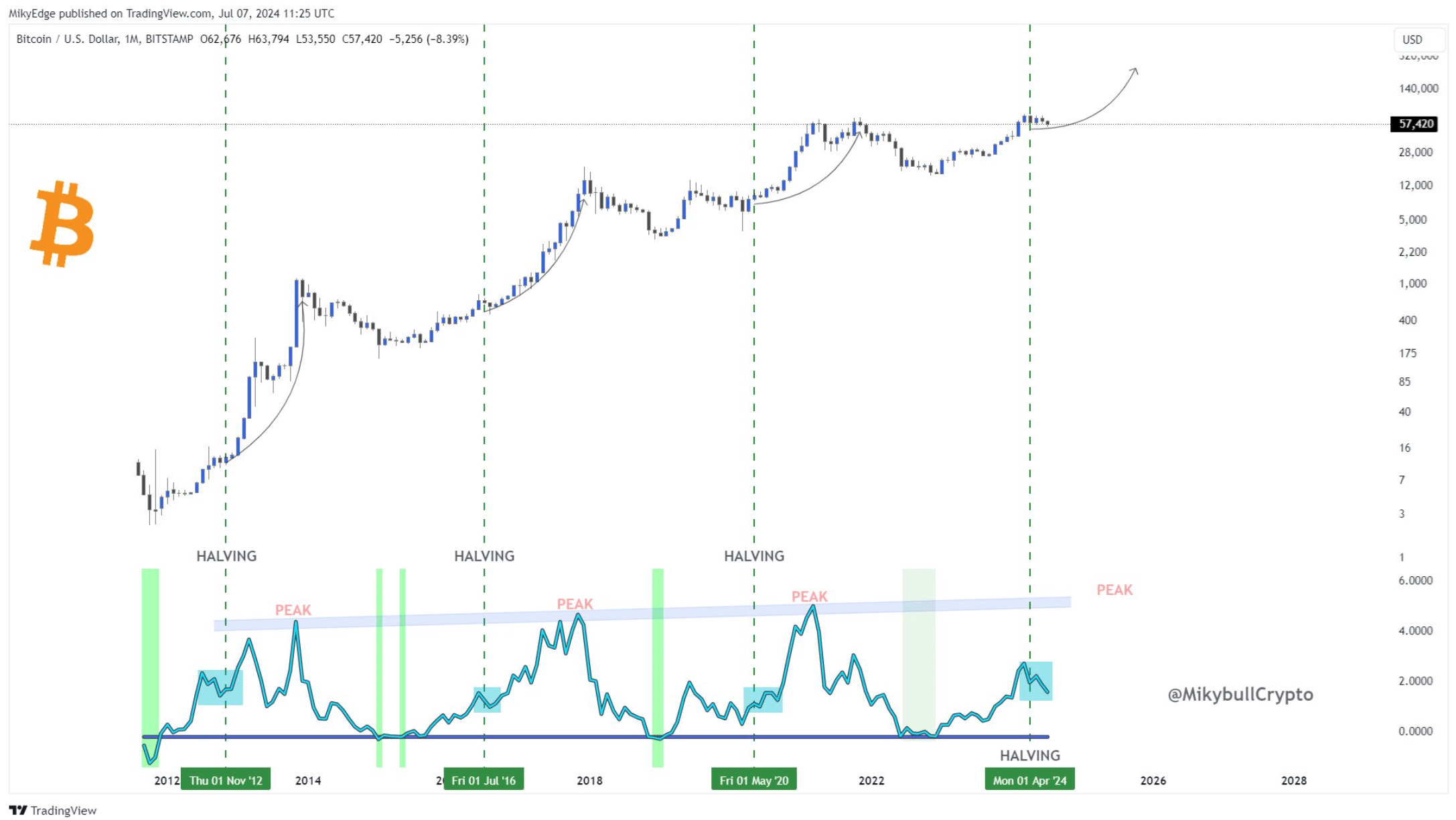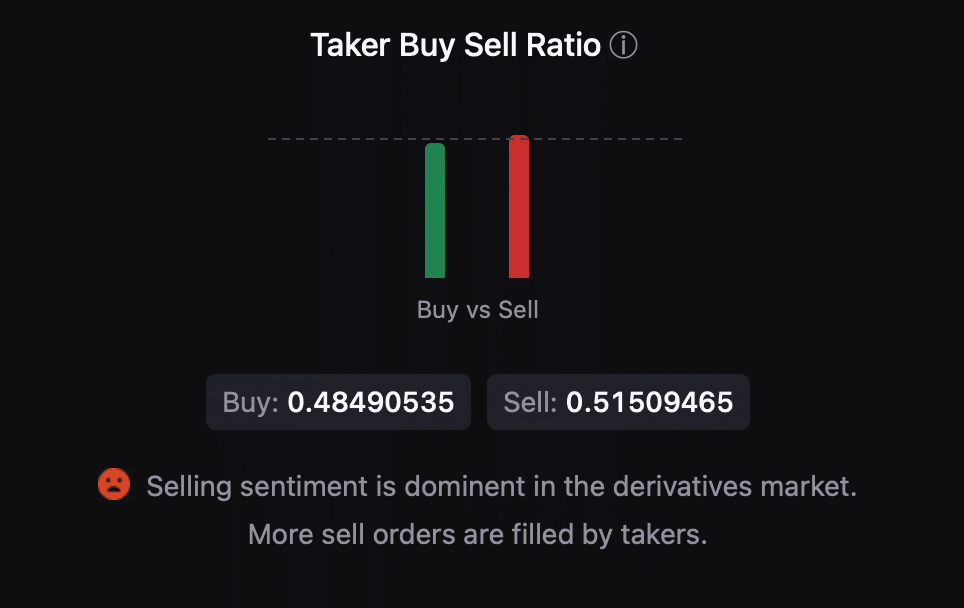- BTC’s price dropped by more than 3% in the last 24 hours.
- Selling pressure on BTC was declining, which can trigger a trend reversal.
After getting bullish for a short while, Bitcoin [BTC] once again witnessed a major price correction. The recent price drop might have once again sparked fear among BTC investors.
However, a look at the bigger picture revealed that BTC was far from reaching the peak of this cycle.
Bitcoin’s upcoming peak
CoinMartketCap’s data revealed that BTC’s price dropped by 13% in the last seven days. During the last 24 hours, the coin’s value dropped by nearly 3%.
At the time of writing, BTC was trading at $55,412.77 with a market capitalization of over $1.09 trillion.
AMBCrypto’s look at IntoThebLock’s data revealed that after the latest price correction, only 75% of BTC investors were in profit, which accounted for over 40.47 million addresses.

Source: IntoTheBlock
However, the entire trend might change in the coming months.
Milkybull, a popular crypto analyst, recently posted a tweet highlighting the relationship between Bitcoin halvings and its cycle peak.
As per the analysis, BTC’s price has always reached a peak nearly two years after halvings. For instance, after the 2012 halving, BTC peaked in 2014.
After BTC’s third halving in 2020, its price reached a cycle peak in 2022. Therefore, if history repeats itself, investors might witness BTC reach a cycle high in 2026, as the 4th halving happened in 2024.

Source: X
This latest analysis suggested that investors should remain confident that the king of cryptos chose to HODL, as the profits they might earn in the coming years could be enormous.
AMBCrypto’s look at IntoTheBlock’s data revealed that investors were actually showing immense confidence in the coin.
This seemed to be the case, as more than 70% of BTC holders were long-term holders, meaning that they were holding the coin for more than a year.

Source: IntoTheBlock
What to expect in the short-term
Since things in the long run looked pretty optimistic, AMBCrypto planned to check BTC’s on-chain data to see what to expect in the short term, as it recently witnessed a correction.
Our look at CryptoQuant’s data revealed that BTC’s exchange reserve was dropping, meaning that selling pressure on the token was diminishing.
Its binary CDD was green, which meant that long-term holders’ movements in the last seven days were lower than average. They have a motive to hold their coins.
Read Bitcoin’s [BTC] Price Prediction 2024-2025
These metrics suggested that Bitcoin’s price chart might soon turn green.
However, its derivatives metrics were bearish. For example, BTC’s taker buy/sell ratio was red, suggesting that selling sentiment was dominant in the market.

Source: CryptoQuant
- BTC’s price dropped by more than 3% in the last 24 hours.
- Selling pressure on BTC was declining, which can trigger a trend reversal.
After getting bullish for a short while, Bitcoin [BTC] once again witnessed a major price correction. The recent price drop might have once again sparked fear among BTC investors.
However, a look at the bigger picture revealed that BTC was far from reaching the peak of this cycle.
Bitcoin’s upcoming peak
CoinMartketCap’s data revealed that BTC’s price dropped by 13% in the last seven days. During the last 24 hours, the coin’s value dropped by nearly 3%.
At the time of writing, BTC was trading at $55,412.77 with a market capitalization of over $1.09 trillion.
AMBCrypto’s look at IntoThebLock’s data revealed that after the latest price correction, only 75% of BTC investors were in profit, which accounted for over 40.47 million addresses.

Source: IntoTheBlock
However, the entire trend might change in the coming months.
Milkybull, a popular crypto analyst, recently posted a tweet highlighting the relationship between Bitcoin halvings and its cycle peak.
As per the analysis, BTC’s price has always reached a peak nearly two years after halvings. For instance, after the 2012 halving, BTC peaked in 2014.
After BTC’s third halving in 2020, its price reached a cycle peak in 2022. Therefore, if history repeats itself, investors might witness BTC reach a cycle high in 2026, as the 4th halving happened in 2024.

Source: X
This latest analysis suggested that investors should remain confident that the king of cryptos chose to HODL, as the profits they might earn in the coming years could be enormous.
AMBCrypto’s look at IntoTheBlock’s data revealed that investors were actually showing immense confidence in the coin.
This seemed to be the case, as more than 70% of BTC holders were long-term holders, meaning that they were holding the coin for more than a year.

Source: IntoTheBlock
What to expect in the short-term
Since things in the long run looked pretty optimistic, AMBCrypto planned to check BTC’s on-chain data to see what to expect in the short term, as it recently witnessed a correction.
Our look at CryptoQuant’s data revealed that BTC’s exchange reserve was dropping, meaning that selling pressure on the token was diminishing.
Its binary CDD was green, which meant that long-term holders’ movements in the last seven days were lower than average. They have a motive to hold their coins.
Read Bitcoin’s [BTC] Price Prediction 2024-2025
These metrics suggested that Bitcoin’s price chart might soon turn green.
However, its derivatives metrics were bearish. For example, BTC’s taker buy/sell ratio was red, suggesting that selling sentiment was dominant in the market.

Source: CryptoQuant























































![What Is Asset Tokenization? Types, Why It Matters Now [2025]](https://coininsights.com/wp-content/uploads/2025/05/asset_tokenization-360x180.png)





























clomid tablet price clomiphene prescription uk cost generic clomid without insurance where to get generic clomid tablets where can i get generic clomid tablets cost of cheap clomid without rx clomiphene calculator
This is the amicable of glad I get high on reading.
More posts like this would persuade the online play more useful.
order azithromycin 500mg sale – buy ciprofloxacin tablets metronidazole price
rybelsus 14mg pills – periactin for sale online cyproheptadine order online
purchase domperidone sale – cyclobenzaprine 15mg generic cyclobenzaprine 15mg cheap